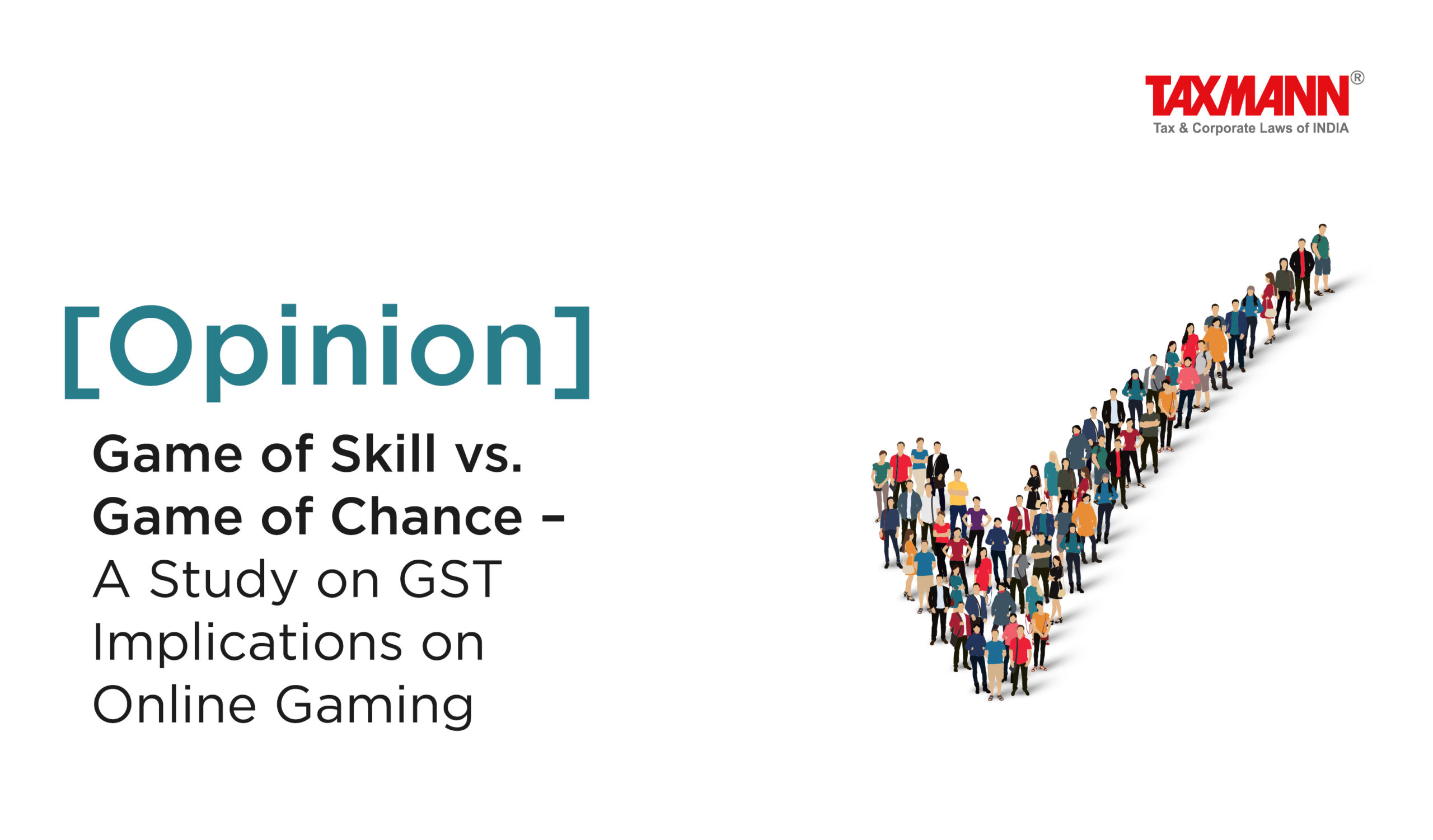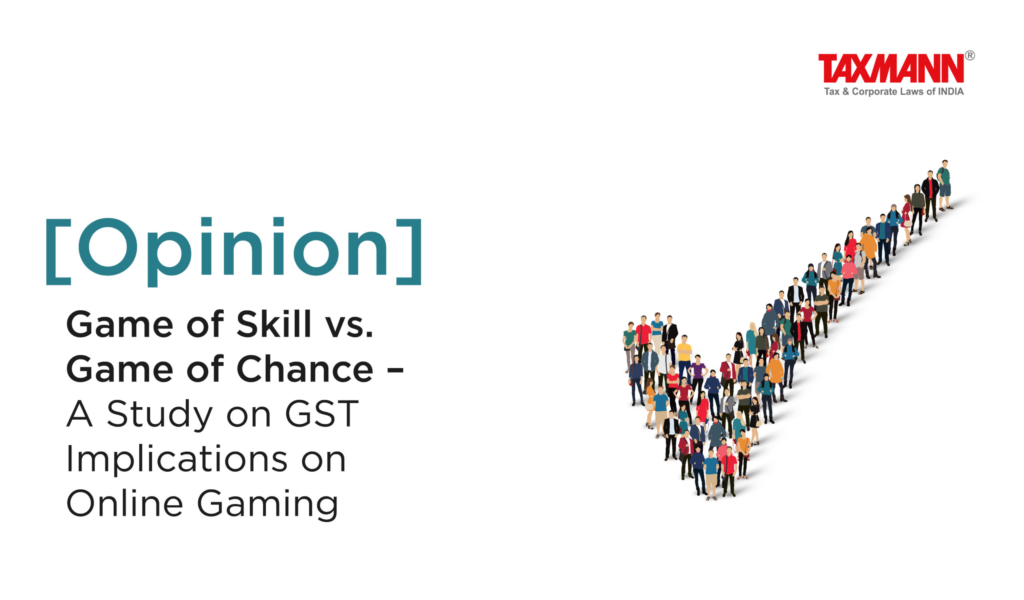
CA Sri Harsha – [2023] 153 taxmann.com 239 (Article)
The decision of Karnataka High Court in Gameskraft Technologies (P.) Ltd. v. Directorate General of Goods Services Tax Intelligence has saved the online gaming industry. The High Court held that games of skill are not to be covered under the expression ‘betting and gambling’ in Entry 6 of Schedule III of CT Act. This was a huge relief for the online gaming industry, which are into organizing the games with skill. Examples can be rummy, cricket and various other games which involve skill rather than chance.
However, on the other hand, the recent decision of GST Council to bring tax on the face value instead of the service fee has rattled the industry. What is furthermore troublesome is the approach of the Council towards these games. The Council has earlier constituted a Group of Ministers (GoM) to study and propose the tax implications on Casinos, Race Courses and Online Gaming. The GoM has submitted its report as part of the 47th GST Council Meeting. The report was taken into consideration during the 50th GST Council Meeting and tax was brought on the complete bet value.
On one hand, the Karnataka High Court and various other Courts have held that games involving skill does not fall under the ambit of expression ‘betting and gambling’ as appearing in Entry 64 of List II of Seventh Schedule to Constitution of India. Applying the same analogy under the GST laws, the Courts (Karnataka High Court in Gameskraft and Bombay High Court in Gurdeep Singh Sachar v. Union of India) held that games of skill does not fall under the ambit of ‘betting and gambling’ as appearing in Entry 6 of Schedule III to CT Act, thereby becoming actionable claims whose supply is treated neither supply of goods nor supply of services. However, as stated earlier, the way the GST Council looks at the above is in complete contradiction.
With the above background, we shall proceed to examine in this article, the various hues of the issue by analyzing the judgment of Karnataka High Court in Gameskraft and take key pointers as to how the law surrounding the gambling and betting vis-à-vis GST is to be interpreted.
Before dealing with the core issue, a few aspects dealing with the scheme of GST to the extent it is relevant to article is worth discussing.
A stark difference between the erstwhile indirect taxation regime to the current GST regime is the definition of ‘goods’. Earlier, the actionable claims are not included in the definition of ‘goods’. They used to be outside the ambit of definition of ‘goods’. Under the GST laws, the definition of ‘goods’ specifically includes ‘actionable claim’. Though, the definition of ‘goods’ specifically include ‘actionable claim’ in its ambit, the supply of all the actionable claims are not categorised as supplies under GST laws. This is evident from reading of Entry 6 of Schedule III to CT Act, which lists, ‘actionable claims, other than lottery, betting and gambling’ as activities or transactions which shall be treated as neither supply of goods nor supply of services. Hence, supply of actionable claims (Other than lottery, betting and gambling) are neither supply of goods nor supply of services.
From the above, it is evident that lottery, betting and gambling are classified as ‘actionable claims’ and thereby brought to tax. In this article, we shall deal only with the betting and gambling, since the issues surrounding the lottery and its valuation are settled by Honourable Supreme Court in Skill Lotto Solutions (P.) Ltd. v. Union of India.
The core issue before the High Court is whether offline/online games such as ‘Rummy’ which are mainly/preponderantly/substantially based on skill and not on chance, whether played with/without stakes amounts to ‘gambling or betting’ for the purposes of GST laws?
Gameskraft Technologies Private Limited (for brevity ‘Gameskraft’) is an online intermediary company who runs technology platforms that allows users to play skill based online games against each other. The platform has over 10 lakh users from across India. A search and seizure action was undertaken on Gameskraft which led to issuance of intimation to pay tax of Rs 2,09,89,31,31,501/- (I have to take help of Google to put the above amount in words – close to Rs 2,100 Crores). The said intimation was the subject matter of the writ proceedings before the High Court. An interim order of stay was granted by High Court. Thereafter, a show cause notice under Section 74(1) was issued to Gameskraft, which were again challenged before the High Court in writ proceedings. All India Gaming Federation and E-Gaming Federation have joined as intervenors supporting Gameskraft before the High Court.
The modus operandi of running the online games as explained by Gameskraft is worth knowing. Gameskraft claims that it has no role/influence in so far as the playing of the games is concerned. The users/players choose the games based on the amount they want to stake to match their skills against other players who want to play a similar amount. Gameskraft merely hosts the games and the discretion to play a game and the stake for which it is to be played entire lies within the domain of user/player and Gameskraft does not have any say in this.
The same is explained by way of an example by Gameskraft, which puts the entire modus operandi in a right perspective. ‘A’ and ‘B’ after downloading the mobile application of Gameskraft, they have to deposit Rs 200/- each for participation in the game. The winner at the end of the game gets Rs 360/- as winnings. For allowing ‘A’ and ‘B’ to use its platform for participating in the game of rummy, Gameskraft would be charging Rs 20 from each, amounting to Rs 40/- in total as ‘platform fee’. Gameskraft is paying tax on Rs 40/- which is the ‘platform fee’ and till the winner is decided, it holds Rs 360/- in a designated account, on which it does not have any right or lien.
The case of the tax authorities is that the Gameskraft is intentionally misclassifying their supplies as supply of services, whereas in fact, the supplies are in the nature of actionable claims (betting or gambling) that is supply of goods. Accordingly, the contention of the tax authorities is that the buy-in amounts received by Gameskraft (that is Rs 400/- in the above example) is consideration for supply of goods and accordingly tax is to be paid on Rs 400/- and not Rs 40/-. Going by this analogy, the tax authorities issued a demand notice treating the entire buy-in amount of Rs 70,000 Crores as consideration for supply of actionable claims.
Click Here To Read The Full Article
The post [Opinion] Game of Skill vs. Game of Chance – A Study on GST Implications on Online Gaming appeared first on Taxmann Blog.
